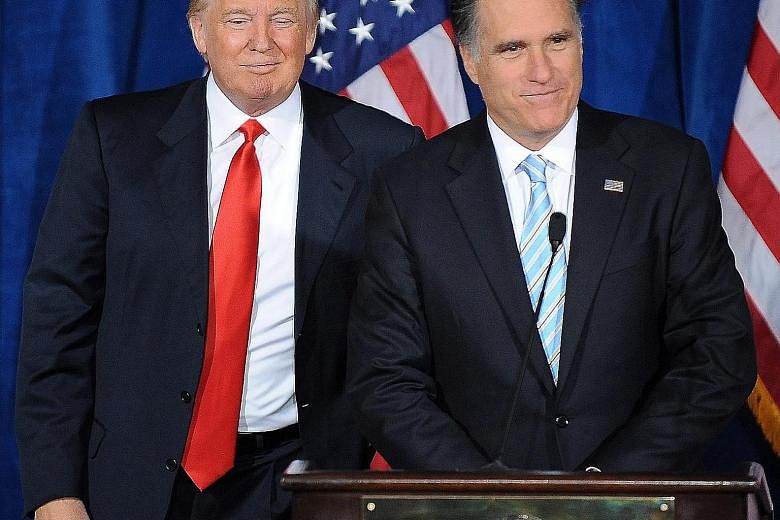If Mr Mitt Romney had won the states of Michigan, Ohio, Pennsylvania and Wisconsin in 2012, he would be president of the US today.
Four years later, these Rust Belt states - once powerful industrial centres - are the exact states Republican front runner Donald Trump says he can win over for the party - and the recent primary victory in Michigan is bolstering his claims.
Today, Mr Trump hopes to clinch victory in a crucial primary in Ohio, where he trails Governor John Kasich by only two percentage points, according to political website RealClearPolitics.
Mr Romney, who has called the real estate mogul "a phony, a fraud", will make his first venture into the 2016 campaign alongside Mr Kasich in Ohio, although he is not endorsing the latter, a source close to Mr Romney told Agence France-Presse.
Florida also votes today and Mr Trump is ahead of his nearest competitor, home-state Senator Marco Rubio, by about 20 percentage points, according RealClearPolitics.
While experts would not put anything past Mr Trump, most say they do not believe the billionaire can expand the Republican base enough to move a significant number of blue, Democrat states to the red column - much less win a general election.
During last Tuesday's primary vote, he won easily in Michigan - the first primary election among the Rust Belt states - with 36.5 per cent of the votes, compared with 24.9 per cent for Texas Senator Ted Cruz and 24.3 per cent for Mr Kasich.
"A normal Republican cannot think of bringing in Michigan," said Mr Trump in a Michigan rally before Tuesday's primary. "And if you don't bring in Michigan, it's tough. You have a very narrow road."
Mr Trump is, of course, no normal Republican. Where Republicans are generally supporters of free trade, he is singing a different tune.
He is all about rejecting free trade, supporting protectionist tariffs and bringing back jobs, especially in the automotive industry, which he spoke about extensively while campaigning in Michigan.
A CNN exit poll showed that 55 per cent of Republican primary voters in Michigan believe trade with other countries takes away US jobs, and the largest proportion of that group voted for Mr Trump.
His anti-trade rhetoric puts him in good stead to win over white blue-collar workers who might otherwise have voted Democrat.
Among independent voters in Michigan, Mr Trump won a plurality of 36 per cent of the self-described independents in the GOP primary, while Vermont Senator Bernie Sanders picked up 71 per cent of this group in the Democratic primary, compared with just 28 per cent going to former secretary of state Hillary Clinton.
"I think he is pulling in some moderate Democrats who feel abandoned by the current candidates for the Democratic nomination," said Professor James Campbell, University at Buffalo (UB) distinguished professor of political science, UB, State University of New York.
So it is not too far-fetched to believe Mr Trump might win some of the Rust Belt states. "This is because many of them are not as strongly Democratic as some people think," said Professor Jeffrey Hill, chair of the department of political science in Northeastern Illinois University. "Michigan, Illinois, Indiana and Ohio, for example, have Republican governors," he added. "Ohio voted for Obama in the past two presidential elections, but in the two years before that it supported the Republican candidate."
That said, the broadening of the base is less significant because of the voter demographic drawn to Mr Trump.
Even if he is attracting more white blue-collar voters, experts say he has little chance of capturing the votes of African-Americans or Hispanics and he is doing damage to the party among moderate conservatives.
The chaos that has erupted at his rallies all but confirms he is a polarising force. Last Wednesday in North Carolina, a white supporter sucker- punched a black protester, while last Friday, Mr Trump cancelled a rally in Chicago due to security concerns, which resulted in scuffles between protesters and supporters.
"The best sources of additional Republican voters are the roughly one-third to one-quarter of white blue-collar and white suburban voters who are not already voting Republican," said Prof Hill, who added that this was probably not enough to win an election.
If winning the Rust Belt states is difficult, then winning solidly Democratic states such as Illinois and New York (Mr Trump's home state) are a herculean task. "There is no real possibility of Trump carrying New York state in the general election. This is a liberal state and even a strong mainstream and sensible conservative would be a long shot to win in New York," said Prof Campbell.
And overall, for an election win, Prof Hill said Mr Trump would need a large turnout of backers and a relatively smaller turnout for his opponents, particularly within the African-American and Hispanic communities. He said: "I don't see this as likely but like just about everyone else, I have underestimated Trump before."
US election 2016: More stories online at: http://str.sg/Zjyq

